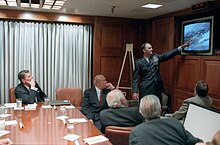
Back Nasionale veiligheid Afrikaans أمن قومي Arabic Milli təhlükəsizlik Azerbaijani Нацыянальная бясьпека BE-X-OLD Национална сигурност Bulgarian राष्ट्रिय सुरक्षा Bihari Difenn ha surentez Breton Seguretat nacional Catalan Diogelwch cenedlaethol Welsh Äußere Sicherheit German


National security, or national defence (national defense in American English), is the security and defence of a sovereign state, including its citizens, economy, and institutions, which is regarded as a duty of government. Originally conceived as protection against military attack, national security is widely understood to include also non-military dimensions, such as the security from terrorism, minimization of crime, economic security, energy security, environmental security, food security, and cyber-security. Similarly, national security risks include, in addition to the actions of other states, action by violent non-state actors, by narcotic cartels, organized crime, by multinational corporations, and also the effects of natural disasters.
Governments rely on a range of measures, including political, economic, and military power, as well as diplomacy, to safeguard the security of a state. They may also act to build the conditions of security regionally and internationally by reducing transnational causes of insecurity, such as climate change, economic inequality, political exclusion, and nuclear proliferation.